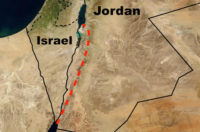Jordan is planning a scaled-back version of a long-touted water-delivery project linking the Red Sea and the Dead Sea. It would supply the kingdom and possibly southern Israel, Jordanian officials announced on Aug. 19.
The proposed project's first phase would involve building a 100-cubic-meter-per-year desalination plant at a cost of about $1 billion, less than one-tenth of the price tag of the far more ambitious project that had been envisioned for decades.
Earlier this year, a World Bank-funded study, ongoing since 2008, concluded that the larger, $10-billion water-pipeline project is feasible.
The scaled-down proposal would involve construction of a water transport system from the Gulf of Aqaba at the northern end of the Red Sea to the south Jordan port of Aqaba, where the desalination plant would be located, Water and Irrigation Minister Hazem Nasser said in a published report.
The brine from the desalination process would be transferred to the Dead Sea via a 200-kilometer pipeline.
Jordan will seek to secure about $400 million in grants, officials said.
A senior Israel Water Authority official said that a team of Israeli experts is studying the Jordanian proposal and has yet to announce its support.
Jordanian Prime Minister Abdullah Ensour said the country may sell some of the water to Israel for use in its arid southern region and, in exchange, buy supply from the Sea of Galilee for use in northern Jordan.
Also, Israel Railways has received final clearance to proceed with electrifying the country’s rail network.
The plan calls for initial electrification of 420 km of existing and planned lines, an estimated $3.2-billion project.
Israel Railways said it is assessing seven bids received in a prequalifying round.
The first actual tenders are for electrification of the 23-km-long Acco-to-Karmiel line and the 56-km-long, high-speed Tel Aviv-to-Jerusalem line that is now under construction. Contracts are set to be awarded in the first quarter of 2014.
“The electrification is a milestone for Israel Railways and would lead to tremendous improvement in the company’s reliability, raise speeds, [and] reduce pollution and road congestion,” said Israel Transport Minister Yisrael Katz.




Post a comment to this article
Report Abusive Comment